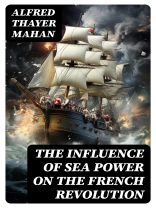In ‚The Influence of Sea Power on the French Revolution, ‚ Alfred Thayer Mahan offers a profound exploration of the intricate relationship between naval power and geopolitical dynamics during the late 18th century. Mahan’s narrative intertwines historical analysis with strategic insights, employing a meticulous examination of maritime activities that shaped the revolutionary fervor in France. His eloquent prose reflects a synthesis of military history and political theory, positioning naval dominance as a pivotal factor influencing the course of the French Revolution and subsequent European conflicts. The book engages with the broader context of maritime power in shaping national interests, making it a seminal work in naval history. Alfred Thayer Mahan (1840-1914), a prominent U.S. naval officer and historian, is best known for his theories on sea power and its crucial role in global strategy. His experiences during a transformative period of naval warfare undoubtedly informed his analysis, as did his profound understanding of history and geopolitics. Mahan’s insights were revered by military leaders and scholars alike, leading to the development of naval policies in various nations, significantly influencing modern naval doctrine. This book is essential for readers interested in military history, politics, and strategy, providing a nuanced understanding of how control over the seas can shape national destiny. Mahan’s rigorous examination offers lasting lessons on the importance of naval power that resonate well beyond the historical period it addresses. The insights laid out in this work continue to inform contemporary discussions on international relations and maritime strategy.
Über den Autor
Alfred Thayer Mahan (1840–1914) was a distinguished American naval officer and historian, renowned for his works on naval warfare and the strategic importance of sea power in shaping history. Born on September 27, 1840, in West Point, New York, he graduated from the United States Naval Academy in 1859. His seminal work, ‚The Influence of Sea Power Upon History, 1660-1783‘ (1890), established him as a leading naval theorist, and he continued to elaborate on those themes in subsequent publications, including ‚The Influence of Sea Power on the French Revolution and Empire, 1793-1812‘ (1892). In this two-volume book, Mahan continued to articulate how control of the seas was crucial in France’s quest for power, and how its eventual defeat was tied to its inability to dominate the seas against the British navy. Mahan’s literary style was marked by detailed historical analysis and his ability to draw strategic lessons from past naval engagements. His influence extended beyond naval strategy; his theories were studied and applied to the expansion of global empires and the conduct of international diplomacy. He lectured and wrote extensively, contributing to the field of strategic thought and military education, until his death on December 1, 1914. Mahan’s work remains a foundational text in the study of naval strategy and military history.












